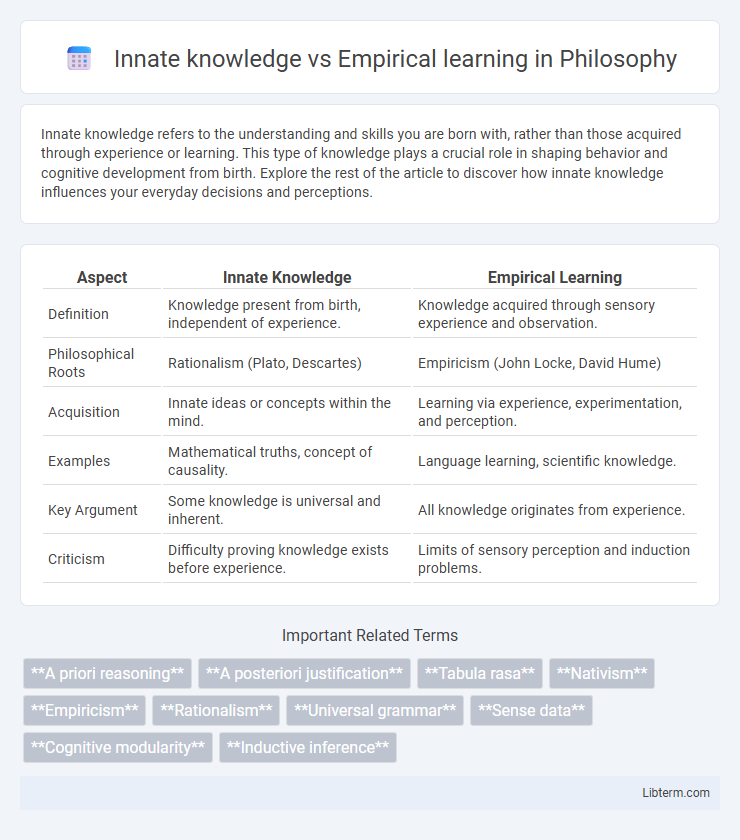Innate knowledge refers to the understanding and skills you are born with, rather than those acquired through experience or learning. This type of knowledge plays a crucial role in shaping behavior and cognitive development from birth. Explore the rest of the article to discover how innate knowledge influences your everyday decisions and perceptions.
Table of Comparison
| Aspect | Innate Knowledge | Empirical Learning |
|---|---|---|
| Definition | Knowledge present from birth, independent of experience. | Knowledge acquired through sensory experience and observation. |
| Philosophical Roots | Rationalism (Plato, Descartes) | Empiricism (John Locke, David Hume) |
| Acquisition | Innate ideas or concepts within the mind. | Learning via experience, experimentation, and perception. |
| Examples | Mathematical truths, concept of causality. | Language learning, scientific knowledge. |
| Key Argument | Some knowledge is universal and inherent. | All knowledge originates from experience. |
| Criticism | Difficulty proving knowledge exists before experience. | Limits of sensory perception and induction problems. |
Defining Innate Knowledge: What Are We Born With?
Innate knowledge refers to the information and abilities that humans possess at birth, independent of experience or sensory input, such as reflexes, basic linguistic capabilities, and instinctual behaviors. This concept contrasts with empirical learning, which is acquired through interaction with the environment and sensory experiences over time. Innate knowledge supports cognitive development by providing a foundational framework for interpreting new information and navigating complex social and physical environments.
Understanding Empirical Learning: Knowledge Through Experience
Empirical learning emphasizes knowledge acquisition through direct experience and sensory observation, relying on evidence gathered from interaction with the environment. This process involves experimentation, reflection, and adaptation, allowing individuals to refine their understanding based on real-world data and outcomes. Empirical learning contrasts with innate knowledge by grounding cognition in practical exposure rather than inherent or pre-existing mental frameworks.
Historical Perspectives: Rationalism vs. Empiricism
Historical perspectives on innate knowledge versus empirical learning center around Rationalism and Empiricism, two influential philosophical schools. Rationalism, championed by thinkers like Descartes and Leibniz, argues that certain knowledge is inborn and accessible through reason alone, independent of sensory experience. Empiricism, advocated by philosophers such as Locke and Hume, asserts that all knowledge originates from sensory experience and observation, emphasizing learning through interaction with the environment.
Cognitive Science Insights: Nature and Nurture Intertwined
Innate knowledge refers to cognitive structures and abilities present at birth, shaping fundamental aspects of perception and reasoning, while empirical learning relies on sensory experiences and environmental interactions to build knowledge over time. Cognitive science reveals that nature and nurture are deeply intertwined, with innate predispositions guiding the way individuals interpret and assimilate empirical data. Neural plasticity exemplifies this dynamic, demonstrating how genetic frameworks and experiential inputs coalesce to shape cognitive development and behavior.
Innate Knowledge in Human Development
Innate knowledge in human development refers to the cognitive abilities and understanding present at birth, enabling infants to recognize language patterns, facial expressions, and basic numerical concepts without prior experience. This form of knowledge is genetically encoded and forms the foundation for later learning by providing an intrinsic framework for interpreting sensory information. Research in developmental psychology and neuroscience highlights the role of innate mechanisms in shaping perception, language acquisition, and social cognition, emphasizing their critical contribution to early cognitive growth.
The Role of Sensory Experience in Learning
Sensory experience plays a crucial role in empirical learning by providing direct interaction with the environment, which facilitates the acquisition of knowledge through observation and experimentation. Innate knowledge, conversely, refers to pre-existing cognitive structures or abilities that do not depend on sensory input for their existence but may be refined through sensory experience. Empirical learning relies on sensory data as its foundation, highlighting the importance of perception in shaping knowledge and understanding.
Case Studies: Language Acquisition and Critical Periods
Innate knowledge in language acquisition is supported by case studies on critical periods, where children exposed to language early develop native-like proficiency, while those deprived show deficits, highlighting an inherent biological framework. Empirical learning is demonstrated through immersive environments that shape vocabulary growth and grammar usage over time, emphasizing experiential influence. Research on feral children and second-language learners underscores the interplay of innate capacities and experiential input during sensitive developmental windows.
Philosophical Debates: Is Pure Innateness Possible?
Philosophical debates about innate knowledge versus empirical learning revolve around whether pure innateness--knowledge existing independently of experience--is possible, as argued by rationalists like Descartes who claim certain ideas are inborn. Empiricists such as Locke counter that the mind begins as a tabula rasa, emphasizing sensory experience as the sole source of knowledge. Contemporary discussions incorporate findings from cognitive science and linguistics, exploring innate cognitive structures versus learned information to assess the extent of pure innateness.
Modern Applications: Education, AI, and Beyond
Innate knowledge informs the development of AI systems that simulate human intuition and instinctive decision-making, enhancing machine learning algorithms. Empirical learning underpins modern educational practices by emphasizing data-driven instruction and experiential learning, fostering critical thinking and adaptability. In fields such as cognitive science and robotics, combining innate knowledge frameworks with empirical learning models drives innovation in personalized education and autonomous systems.
Striking a Balance: Integrating Innate and Acquired Knowledge
Striking a balance between innate knowledge and empirical learning enhances cognitive development by combining genetic predispositions with experiential insights. Innate knowledge provides foundational frameworks, while empirical learning refines understanding through sensory input and environmental interaction. Integrating both approaches fosters adaptive intelligence, enabling individuals to navigate complex environments effectively.
Innate knowledge Infographic

 libterm.com
libterm.com